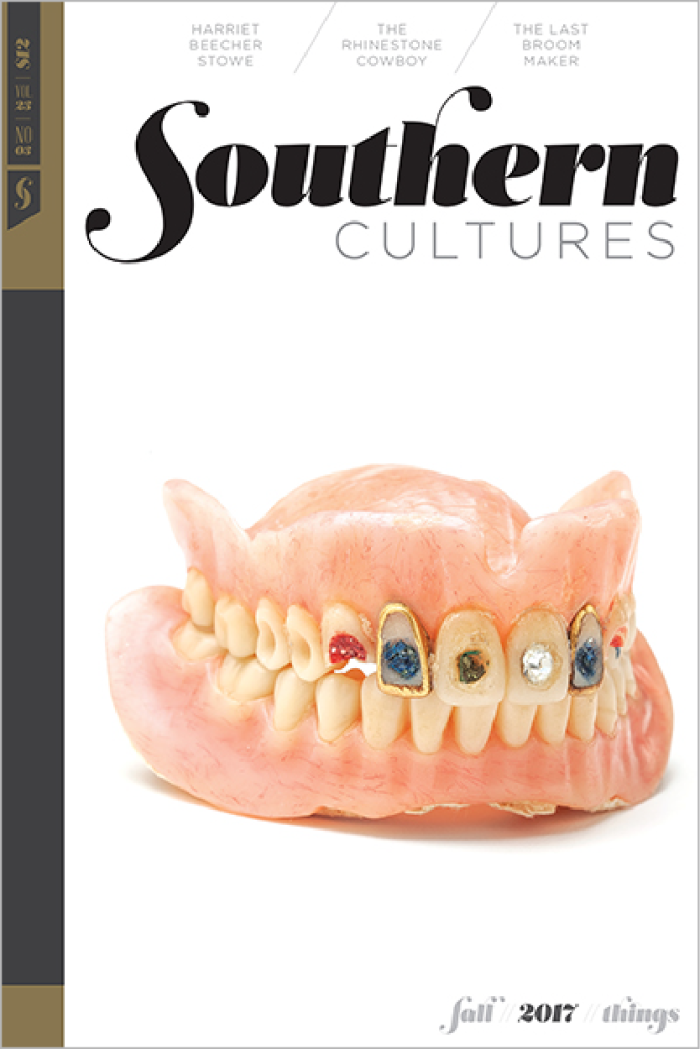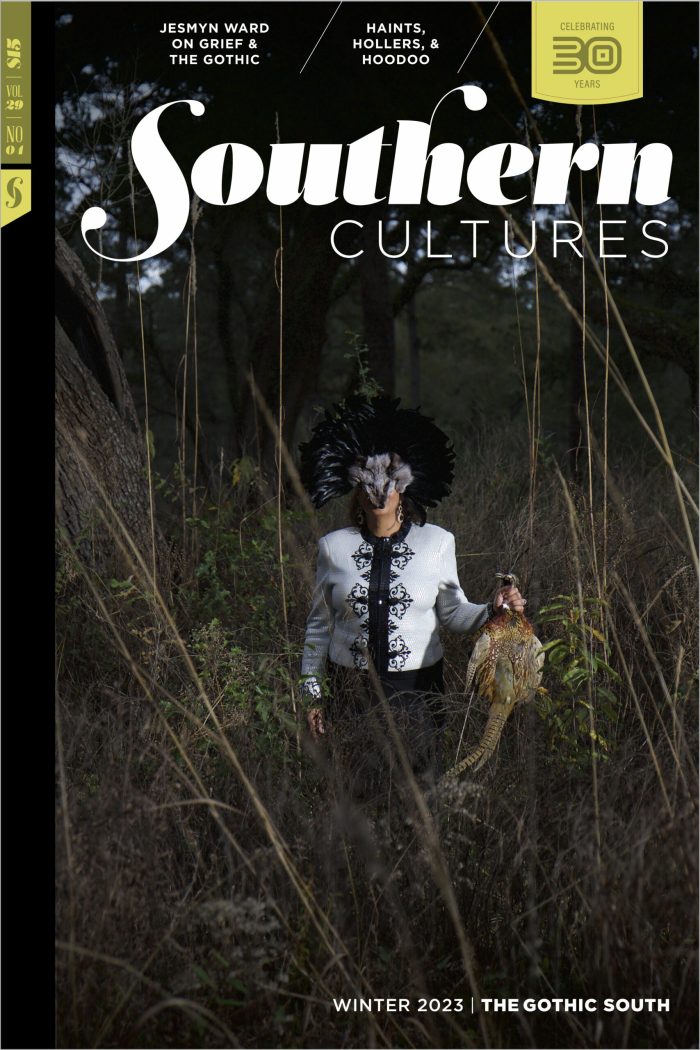Essay
by Marcie Cohen Ferris
Southern things have been very loud of late. Like a scene from any one of the dystopian television series so popular right now in an anxiety-ridden America—imagine a Deep South setting for The Leftovers—”things” are misbehaving. Across the South, a number of iconic southern landscapes and objects are shifting in meaning, and we cannot turn »
Essay
by Bernard L. Herman
Material culture is best understood as the history and philosophy of objects. It proceeds from the idea that objects, tangible and imagined, locate the entirety of human experience and understanding. We are simply creatures that know and make sense of the world and our places within it through things. Southern things superintend the vast and »
Photo Essay
by Wendel A. White
Manifest is an ongoing project, a portfolio of nearly one hundred photographs of African American material culture held in public and private collections throughout the United States. These repositories have accumulated diaries, receipts for the purchase of humans, hair, a drum, a door, photographs, figurines, and other artifacts—some with great historical significance, some the commonplace, »
Essay
Oranges and the Politics of Reconstruction in Harriet Beecher Stowe's Florida
by Shana Klein
In the years following the Civil War, famed author and abolitionist Harriet Beecher Stowe painted a number of canvases of Florida oranges. One in particular resembles the view from Stowe’s window, displaying a cluster of fruit cascading down a leafy tree. Stowe completed this painting after 1867, when she purchased an orange grove in Mandarin, »
Essay
by Ryan K. Smith
The headstone marking the grave of Philip N. J. Wythe now lies flat on its back, face to the sun, partially hidden among the tall grasses at the Barton Heights Cemeteries in Richmond, Virginia. The marker’s form is deceptively simple. Made of coarsegrained sandstone, it features no pictorial symbols, no death’s head or cherub or »
Essay
A Tale of Two Silver Bowls
by Dale Rosengarten
This is the story of two silver bowls whose journeys since the decade of the American Civil War make interesting narratives in themselves because they follow closely what the late French historian Marc Bloch called “the vicissitudes of life.” The tale is one of return, and of loss averted, reassuring to white southerners, Christians and »
Essay
by Dave Tell
The ruins of Bryant’s Grocery & Meat Market and the beautifully restored Ben Roy’s Service Station stand sixty-seven feet apart from each other on the southern edge of Money, Mississippi, the small hamlet visited by Emmett Till in August 1955. Both stores are now owned by a trio of siblings with a personal investment in »
Essay
North Carolina's Coal Glen Mine
by Forest Hazel
When Sam Hall arrived for his morning shift at the Coal Glen coal mine on the morning of May 26, 1925, it was just another day on the job. He had been employed for some months as an underground miner, laboring thousands of feet from the sunlight every day, extracting the Deep River’s “black diamonds” »
Art
Chris Luther's Bridge Bowl and the Seagrove Tradition
by Trista Reis Porter
Just as the most iconic or familiar of things have the capacity to complicate and contradict what we know of southern life, unpredictable things can exemplify both paradoxical and iconic realities. This is the story of Chris Luther’s Bridge Bowl, an unexpected southern thing, both a container and a bridge itself. Made in Seagrove, North »
Art
by Jennifer Joy Jameson
Loy Bowlin’s bejeweled dentures—a different color rhinestone on each tooth, two front teeth framed in gold—were a prelude to his creative output. Born on a cattle ranch in Franklin County, Mississippi, in 1909, Bowlin was a shade-tree mechanic and former used car salesman, who, upon retiring, took on a persona as McComb, Mississippi’s “Original Rhinestone »
Essay
by Julia Ridley Smith
For almost thirty years, my parents ran an antique shop in an old two-story house in downtown Greensboro, North Carolina. When I was little, stuff arrived and departed by way of my mother’s van, a matte-green 1970s camper, stripped of its bunk and golden burlap curtains. It had no air conditioning and smelled of cigarettes »
Interview
by Emily Hilliard
Jim Shaffer’s shop is dusty and smells like a horse stable—a comforting olfactory association that I suddenly realize has less to do with horses than with the rolled and bundled straw I see stacked high along the walls. Though the pole barn that houses Shaffer’s Charleston Broom and Mop Company is just a few miles »
Essay
by Rebecca Sharpless
Last year, I bit the bullet, so to speak, and bought two Le Creuset pots that the upscale neighborhood chain calls “Dutch ovens.” After more than thirty years of use by me and at least that many by my Aunt Exa before that, my WearEver aluminum set had become pitted and just about worn out, »
Essay
Automobiles in the Photographs of Reverend L. O. Taylor
by Emily Ridder-Beardsley
In one of his most compelling and enigmatic photographs, Reverend Lonzie Odie Taylor (1899–1977) sits on the running board of his car, fist under his chin. A Baptist minister and self-taught African American photographer, Taylor’s photographs—including his self-portraits—reflect desires and aspirations for material success in a rapidly modernizing South, including for cars. In offering mobility, »
Essay
How a Fish Came to Represent the Coushatta Tribe of Louisiana
by Denise E. Bates
The garfish is a “prehistoric hang-over,” a living fossil that has inhabited southern waterways for millennia. Archeologists have found gar fossils, up to 9, 000 years old, from sites throughout the Southeast and have identified five different species that range in size from the smaller Florida gar, measuring approximately two feet long, to the alligator »
Poetry
by Tyree Daye
1The scar that flows from my aunt’s thighto the boulder of her swollen ankle is a mapof the Haw River,each toe a Blue Heron. 2My mama’s water is all water, I’m every river rockinside her being smoothed over. 3The palms of my uncle’s handsare the Deep River when he is holding a gutted trout.Always somethingis bleeding. »





